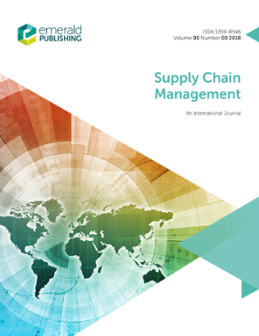Supply Chain Management
Issue(s) available: 161 – From Volume: 1 Issue: 1, to Volume: 29 Issue: 7
Strapline:
An International Journal
Volume 29
Volume 28
Volume 27
Volume 26
Volume 25
Volume 24
Volume 22
Volume 21
Volume 20
Volume 19
Volume 18
Volume 17
-
Issue 6 2012
-
Issue 5 2012 Building theory in supply chain management through systematic reviews of the literature part 2
-
Issue 4 2012 Building theory in supply chain management through systematic reviews of the literature. Part 1
-
Issue 3 2012
-
Issue 2 2012
-
Issue 1 2012 Green supply chain how do carbon management and sustainable development create competitive advantage for the supply chain
Volume 16
Volume 15
Volume 14
Volume 12
Volume 10
When digital transformation meets supply chain needs in emerging markets: contributions for social and economic performance
Laura V. Lerman, Guilherme B. Benitez, Julian M. Müller, Paulo Renato de Sousa, Alejandro Germán FrankSupply chains are increasingly incorporating social perspectives into their activities. It is often argued that social initiatives in supply chain management (SCM) are a response…
Sustainable purchasing supply management assessment in construction supply chains: a design science research approach
Diego A. de J. Pacheco, Daniel Møller ClausenIn response to multiple disruptions, the purchasing supply management (PSM) function in construction supply chain management (CSCM) has gained prominence due to stakeholder…
Firm survivability during long-term disruptions: an adaptation-based view
Khadija Echefaj, Anass Cherrafi, Abdelkabir Charkaoui, Tim Gruchmann, Dmitry IvanovThe COVID-19 pandemic showed that preestablished contingency plans and resilience practices were insufficient to cope with long-term and global disruptions. Companies thus…
Backward supply chain information sharing: who does it benefit?
Zhaojun Han, Baofeng Huo, Xiande ZhaoThe purpose of this study is to explore the effect of backward supply chain information sharing (SCIS) on the performance of different parties along supply chains.
ISSN:
1359-8546Online date, start – end:
1996Copyright Holder:
Emerald Publishing LimitedOpen Access:
hybridEditor:
- Prof Beverly Wagner
